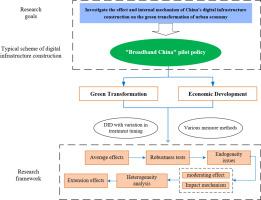The role of digital infrastructure construction on green city transformation: Does government governance matters?
IF 6
1区 经济学
Q1 URBAN STUDIES
引用次数: 0
Abstract
The dividends brought by national strategic construction such as digital infrastructure inject vitality into the green transformation of urban economy. This study empirically examines the impact of digital infrastructure on urban green transformation using panel data from 279 prefecture-level and above cities in China spanning 2006 to 2022, employing a multiple time point difference-in-differences approach. Results indicate a significant positive effect of digital infrastructure construction on urban economic green transformation. Digital infrastructure primarily promotes green transformation through pollution reduction, technology agglomeration, and structural optimization effects, with technological innovation and the integration of manufacturing and service industries being stable mechanisms. Environmental regulations, government strategic guidance, and institutional environments reinforce this effect. The promotion effect is more pronounced in the central region and exhibits a pro-poor characteristic, benefiting smaller, non-resource-based cities, and areas with higher information and communication technology application levels. In expansive analysis, the spillover effect of the “Broadband China” pilot policy may strengthen over time.

数字基础设施建设对绿色城市转型的作用:政府治理重要吗?
数字基础设施等国家战略建设带来的红利为城市经济的绿色转型注入了活力。本研究利用 2006 年至 2022 年中国 279 个地级及以上城市的面板数据,采用多时点差分法,实证检验了数字基础设施对城市绿色转型的影响。结果表明,数字基础设施建设对城市经济绿色转型有明显的正向影响。数字基础设施主要通过污染减排、技术集聚和结构优化效应促进绿色转型,其中技术创新和制造业与服务业融合是稳定机制。环境法规、政府战略指导和制度环境强化了这一效应。促进效应在中部地区更为明显,并表现出扶贫特征,有利于规模较小、非资源型城市以及信息和通信技术应用水平较高的地区。从扩展性分析来看,"宽带中国 "试点政策的溢出效应可能会随着时间的推移而增强。
本文章由计算机程序翻译,如有差异,请以英文原文为准。
求助全文
约1分钟内获得全文
求助全文
来源期刊

Cities
URBAN STUDIES-
CiteScore
11.20
自引率
9.00%
发文量
517
期刊介绍:
Cities offers a comprehensive range of articles on all aspects of urban policy. It provides an international and interdisciplinary platform for the exchange of ideas and information between urban planners and policy makers from national and local government, non-government organizations, academia and consultancy. The primary aims of the journal are to analyse and assess past and present urban development and management as a reflection of effective, ineffective and non-existent planning policies; and the promotion of the implementation of appropriate urban policies in both the developed and the developing world.
 求助内容:
求助内容: 应助结果提醒方式:
应助结果提醒方式:


